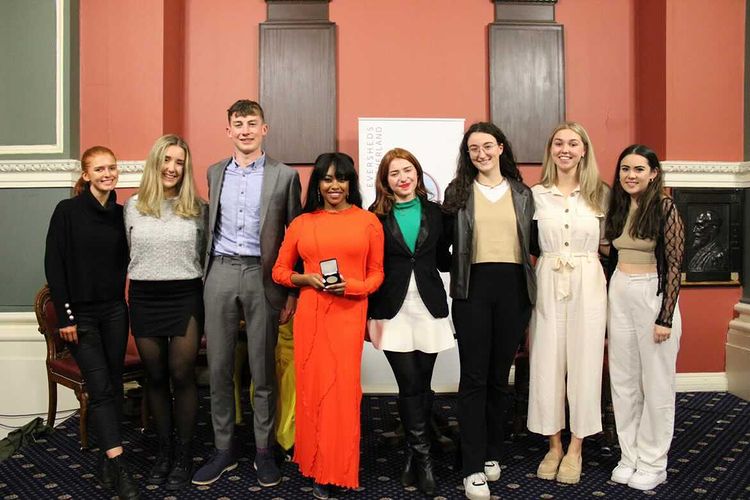Trinity College Law Society (LawSoc) yesterday honoured hip-hop artist Denise Chaila with the Allii Proelio award. The evening was led by the Law Society Secretary Ruth Brady, who described the ceremony as “a very proud day” and explained that the award was intended to recognise public figures who had expanded students’ perspectives. Chaila, the Irish and Zambian rapper who last summer headlined Ireland’s first post-pandemic festival in the Royal Hospital, was praised by Brady for her work ethic and humility.
Brady began by asking Chaila if she had ever imagined achieving success in the music industry. “Yeah”, Chaila responded simply, to resounding laughter, before elaborating: “Did I anticipate that this would be my life? Absolutely not. But did I imagine? Yeah. I spent a huge part of my life daydreaming”. She discussed her early aversion to the traditional workforce – “No shade to office jobs, but that’s not what sparks joy for me”. She didn’t always know what form this desired music career would take, she explained – whether it would mimic the viral video of Kylie Mingoue performing to a group of unimpressed delegates, or whether it would more closely resemble Beyoncé at Coachella.
Chaila, who impressed the audience with a natural charisma and eloquence, attended the University of Limerick for six years without graduating, first studying politics and international relations, and later sociology and English. When Brady pointed out that this is an unusual beginning to a career in the music industry, she responded: “We know ourselves for a long time before we let ourselves be who we are”. She described her university experience as a process of learning about the world but always referring it back to words and music: “How does hip-hop relate to Weber? How would Marx sit in conversation with Snoop Dogg?”
She also recounted gathering inspiration from some more contemporary references, like bell hooks and Kendrick Lamar. Eventually, she recalls, she realised that her true calling lay in music, upon the realisation that “what you love has value … all you need to do is love it back”.
Brady then asked what it was that inspired Chaila musically. “Those are good, impossible questions”, she replied. “Impossible to answer because the answer has to change as I grow up”. She is most motivated, she revealed, by a desire to represent herself correctly and to make others happy, and to avoid making music that’s morally or emotionally grating. “How do I avoid the pitfalls of writing a song that’s catchy but doesn’t feel good?”
She commented on the fact that the audience was made up mostly of students, and offered some words of reassurance. “Everyone that I respect feels that everything is uncertain”. A virtuous life, she elaborated, is found when we embrace this uncertainty and relinquish the desire to control or the societally-imposed need to forge a traditional path. The key, she proclaimed, is to “pick one thing that you can’t let go of and pursue your dignity”. In doing so, “things do, somehow, fall into place”.
Brady then asked Chaila what she believed to be her greatest accomplishment. “I haven’t had it yet”, she replied. “If I say I’ve had one, I put a beginning and an end on something … I’m still working my way through it”. Traditional achievements, she explained, “aren’t necessarily metrics by which I measure my life”. Accomplishment traditionally requires competition, and, she noted, “the goal is not to win by virtue of defeating someone, but rather, I want to build a community of creativity”. She then decided that her greatest accomplishment was even coming to that conclusion at all.
Brady then referred back to the purpose of the award – to recognise those who had broadened students’ perspectives. She asked Chaila whether it was important to her to try and broaden people’s perspectives, especially in light of the social change brought about by the pandemic and the Black Lives Matter movement. “I don’t think any human has the ability to widen a person’s thinking if they are not willing to open it themselves – all we can do is offer the choice”. Most social conflict is simple, she reasons, and complicated by humans, and that we can untangle things for ourselves by simply asking “Do I have the capacity to have compassion?”
Brady then touched on the backlash public figures often receive for speaking out in times of perceived injustice. Chaila admitted to a fear of speaking out, but explained, “Malcolm X was just a man, and I am just human, and the same ideologies that he was fighting against exist right now, and we need someone to speak out against them, and that is more important than my cowardice … When you have a target on your back, symbolically, you are also a lighthouse who draws people in”.
Brady closed the talk by asking Chaila about her pandemic experience. She detailed the difficulties of rising to fame during isolation, and her struggle to reconcile her private and public life. She finds the concept of celebrity “dehumanising”, especially for a black woman – “there’s an element of you that is now public property”. She conceded that the pandemic had a silver lining: “People who were lonely before lockdown are less lonely now”. She touched on the increased accessibility of events, giving the examples of sexual assault survivors who feared crowds but could now attend concerts virtually, or disabled people who had once been denied an accessible education but could now study online. “I’m so happy that we’re in a place where at least something is good.”







